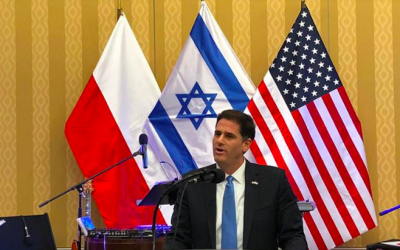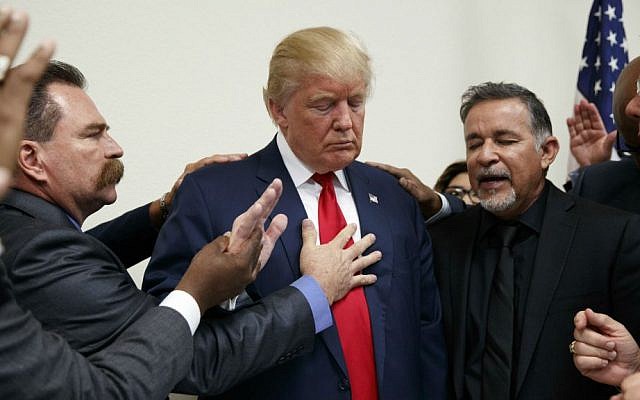T. Belman.. After two years of Pres Trump, 75% of the young evangelicals supported Israel. What could possibly have caused such a dramatic drop to 33% in three years.
During those 3 years, the percentage having a positive view of Muslims increased from 29% to 42% viewed Muslims . This is probably as a result of the Abrahamic Accords.
Since 2018, backing for Israel dropped from 75% to 33%; nearly half of evangelicals aged 18-29 say they favor establishment of Palestinian state, voted for Biden over Trump
By JACOB MAGID , TOI
Prime Minister Benjamin Netanyahu speaks at the Evangelical Christian movement and a mission of approximately 800 members of Pastor John Hagee’s Christians United for Israel (CUFI) organization, in Jerusalem on March 18 2012. (Amos Ben Gershom/Flash90)
NEW YORK — A new survey points to a growing divide in the US between young evangelical Christians and their elders, particularly in their views on the Israeli-Palestinian conflict, indicating Israel could see a significant drop in support in coming years.
While the religious group has long been a bulwark of support for Israel in the US, the Barna Group-administered poll commissioned by researchers at the University of North Carolina at Pembroke indicates a sharp drop in support for the Jewish state and raises concerns that Israel could lose a key ally going forward, its authors told The Times of Israel on Monday.
The poll was commissioned as part of their research for an upcoming book on the issue.
In a poll of over 700 evangelical Christians between the ages of 18 and 29 that was conducted between March and April, respondents were asked where they place their support in the “Israeli-Palestinian dispute.” Just 33.6 percent said with Israel, 24.3% said with the Palestinians and 42.2 percent said with neither side.
This marked a significant shift from 2018, when a survey of young evangelicals conducted by the same UNCP professors, Motti Inbari and Kirill Bumin, found that 75% of respondents sided with Israel over the Palestinians, while 22% preferred not to take a side in the dispute. Just 2.8% expressed some degree of support for the Palestinians then.

Illustrative: Evangelical Christians from various countries wave flags as they march to show their support for Israel in Jerusalem. (AP Photo/Sebastian Scheiner, File)
Almost 45% of respondents now support the establishment of a Palestinian state alongside Israel, 35.1% said they are neutral on the issue, and only 20.5% oppose the idea of Palestinian statehood, according to the 2021 poll, whose results were shared with The Times of Israel. In 2018, the question on the topic was slightly different, but 29% percent of respondents said they opposed territorial concessions by Israel for peace with the Palestinians.
Over 22% responded that Israel does not treat Palestinians fairly, 35.7% were neutral on the issue, while a plurality (41.5%) responded that Israel treats Palestinians fairly, the latest poll found.
The online UNCP survey of young evangelicals had a 3.7 percentage point margin of error with a 95% level of confidence.
Contextualizing their findings, Inbari and Bumin noted in a statement that evangelicals have historically supported Israel based on their End Times theology, which connects the creation of the State of Israel with the Second Coming of Jesus Christ.
The professors, therefore, chose to ask young evangelicals if their views regarding Israel are based on their religious beliefs.
Notably, over 44% of respondents said that their religious beliefs do not influence their assessment of the Israeli-Palestinian conflict. Over 38% said their religious beliefs lead them to view Israel more favorably, and 17.4% said that their religious beliefs lead them to be more supportive of the Palestinians.
When it comes to the issue of Jerusalem, only 28.4% of respondents said that East Jerusalem should be the capital of a future Palestinian state, while 71.6% said that the city in its entirety should forever remain Israel’s capital.
Evangelical pressure was key in getting former US president Donald Trump to recognize Jerusalem as Israel’s capital and move the US embassy to the city.
Asked to explain the discrepancy between younger and older Evangelicals, 34% of respondents said it had to do with “generational difference,” 22.5% said it had to do with younger evangelicals being less knowledgeable about the conflict than the older generations, and 29.8% said they did not know.
Nearly half of respondents admitted to having very limited or no knowledge of the Israeli-Palestinian conflict.
While Israel is often deemed a top issue for evangelical voters, 65% of the young respondents said they seldom or never hear about the importance of supporting the Jewish state, with just 12% saying they hear it every week.

Israeli Ambassador to the US Ron Dermer addresses a Hanukkah reception at the Washington D.C. residence of Poland’s Ambassador the US Piotr Wilczek, December 3, 2018 (screen shoot: facebook.com/ambdermer)
The survey was publicized two weeks after former Israeli ambassador to the US Ron Dermer Former suggested that Israel should prioritize the “passionate and unequivocal” support of evangelical Christians over that of American Jews, who he said are “disproportionately among our critics.”
“People have to understand that the backbone of Israel’s support in the United States is the evangelical Christians. It’s true because of numbers and also because of their passionate and unequivocal support for Israel,” Dermer said in an onstage interview at a conference organized by Makor Rishon, a news outlet affiliated with Israel’s right-wing national religious community.
“About 25% [of Americans] — some people think more — are evangelical Christians. Less than two percent of Americans are Jews,” he said. “So if you look just at numbers, you should be spending a lot more time doing outreach to evangelical Christians than you would do to Jews.”
He highlighted the “passion and support” for Israel among evangelicals, claiming that Israel is one of the most important, if not the most important, issue for many of them, contrasting the religious group to American Jews who he said vote on other issues.
However, the results of the UNCP survey indicated starkly different feelings among young evangelical Christians.
In a conversation with The Times of Israel, Inbari encouraged the Israeli government to pay attention to shifting opinions among evangelicals, as “it’s not a unified movement with one opinion. There are mixed opinions on Israel.”
“It’s become evident that Israel is developing a public relations problem with younger Americans. We see it with evangelicals as with American Jews and other groups,” he added.
More moderate, not fans of Trump
The UNCP professors also surveyed young evangelical Christians’ views more broadly.
According to their study, 46% of respondents voted for Joe Biden in the 2020 presidential election, compared to only 26% for Trump.
Additionally, 20% said that they did not vote at all and 48.5% said that they are Democrats or lean in favor of the Democratic Party. Roughly 40% said they affiliate with or lean toward the Republican Party.
Young evangelicals are more likely to consider themselves centrist or moderate (37.5%), rather than conservative (31%) or liberal (31.5%), according to the survey.

Pastors from the Las Vegas area pray with then Republican presidential candidate Donald Trump during a visit to the International Church of Las Vegas and International Christian Academy on Oct. 5, 2016, in Las Vegas, Nevada. (AP Photo/Evan Vucci)
The Associated Press VoteCast survey after the elections showed that 81% of all White evangelical voters backed Trump, compared with 18% who voted for Biden.
The 2021 UNCP survey found that among Republican and Republican-leaning respondents, 66.1% identified as white while among Democrats and Democrat-leaning respondents, only 29.2% identified as white.
A comparison of the 2018 and 2021 surveys also showed a shift in the views of young evangelicals on Muslims, with 41.7% of respondents now expressing a positive view, compared to 29% three years ago.
“What still remains unclear is whether these attitudes will change as this age group grows older, becoming similar to the views of previous generations (and thus more favorable toward Israel), or whether their attitudes will remain critical of Israel even as young evangelicals age,” Inbari and Bumin said in a statement.




It means that they see American Jews not supporting Israel so they see no reason why they should support the Jewish state.
@ deanblake:
Michael S Said:
ON THE CONTRARY. IN GENERAL THEY ARE STEADFAST.
I suggested the Abrahamic Accords caused a more positive view of Muslims, to develop. In essence the moderate Muslims/Arabs replaced the Jihades in the news. In other words, Muslims were getting better press for a while.
Ted,
With so much bias and fake news around nowadays, it’s not an easy job to communicate. Let me try to unravel this:
1. You posted an article entitled,
“Support for Israel among young US evangelical Christians drops sharply — survey”
That is a deceptive title. The survey doesn’t show any support “dropping”, and indeed, “apples are not being compared with apples”. Respondents to the 2018 survey are now three years older than they were then; and the “18-29 year olds” surveyed on this latest exercise were certainly not those surveyed then. So much for the “apples and apples” comment; but none of this has anything to do with what I said.
2. You said, “This is probably as a result of the Abrahamic Accords.”, and I said,
“I don’t think so… The survey was of “evangelicals aged 18-29”. If any other group, including your own children, were asked these questions, I will bet they will show as much difference from their elders in these matters as this survey of “evangelicals” (whoever they are).”
In other words, the survey was worded in such a way as to make it seem that EVANGELICAL support for Israel was dropping; but in fact, evangelical support in any particular age group was probably not too different from 2018. It was among YOUNG PEOPLE IN GENERAL, that support for Israel has been eroding over the years, REGARDLESS OF THEIR RELIGION. That is an observable fact; but the article you posted was worded in such a way, that readers like Dean Blake said,
“It means Evangelicals are fickle and unreliable friends,”
It doesn’t mean this at all.
@ Ted Belman:
Ted, you’re not listening. OK, have it your way: Everyone hates you.
@ Michael S:
This article compares those numbers to what was in 2018,
So it compared apples to apples, not oranges.
@ stevenl:
Hi, Steven. Disinformation is the name of the game. The Hill says,
“There is no mistaking the depth of the generational split.
“Late last month, Gallup asked Americans whether Israel’s recent actions against Hamas were justified or unjustified. Those who were 65 or older backed Israel by a wide margin: 55 percent to 31 percent. But those aged between 18 and 29, said by more than a two-to-one margin — 51 percent to 25 percent — that Israel’s actions were unjustified.”
— https://thehill.com/policy/international/214756-are-us-millenials-turning-away-from-israel
Most Americans are totally ignorant of and uninterested in what is going on in Western Europe with the Islamists or even what is going on with China.
Ignorance is bliss and when combined with uninformed biases or disinformation, can be fatal.
Ted, you said,
“This is probably as a result of the Abrahamic Accords.”
I don’t think so. It’s really just what Mark Twain called, “lies, damned lies and statistics”. The survey was of “evangelicals aged 18-29”. If any other group, including your own children, were asked these questions, I will bet they will show as much difference from their elders in these matters as this survey of “evangelicals” (whoever they are).
You’re in Israel, so I can understand why you didn’t catch this. Your media there seems to be as biased and misleading as the media here in the US. The deception, is in saying this is a poll of “evangelicals”, when actually it is a poll of people (of any persuasion, really) born between 1992 and 2003. Otherwise, the “damned lies and statistics” seem reasonably accurate:
“According to their study, 46% of respondents voted for Joe Biden in the 2020 presidential election, compared to only 26% for Trump. Additionally, 20% said that they did not vote at all and 48.5% said that they are Democrats or lean in favor of the Democratic Party. Roughly 40% said they affiliate with or lean toward the Republican Party.”
Notice that support for Donald Trump in this age group is less than half of what it is among voters at large. That’s the key to understanding the results.
BTW: Deanblake, Sorry to disappoint you with the truth,
It means Evangelicals are fickle and unreliable friends, easily swayed by liberal sentiment rather than right and wrong. Those of us who adhere to the Law rather than a doctrine of ‘love’ already knew that.